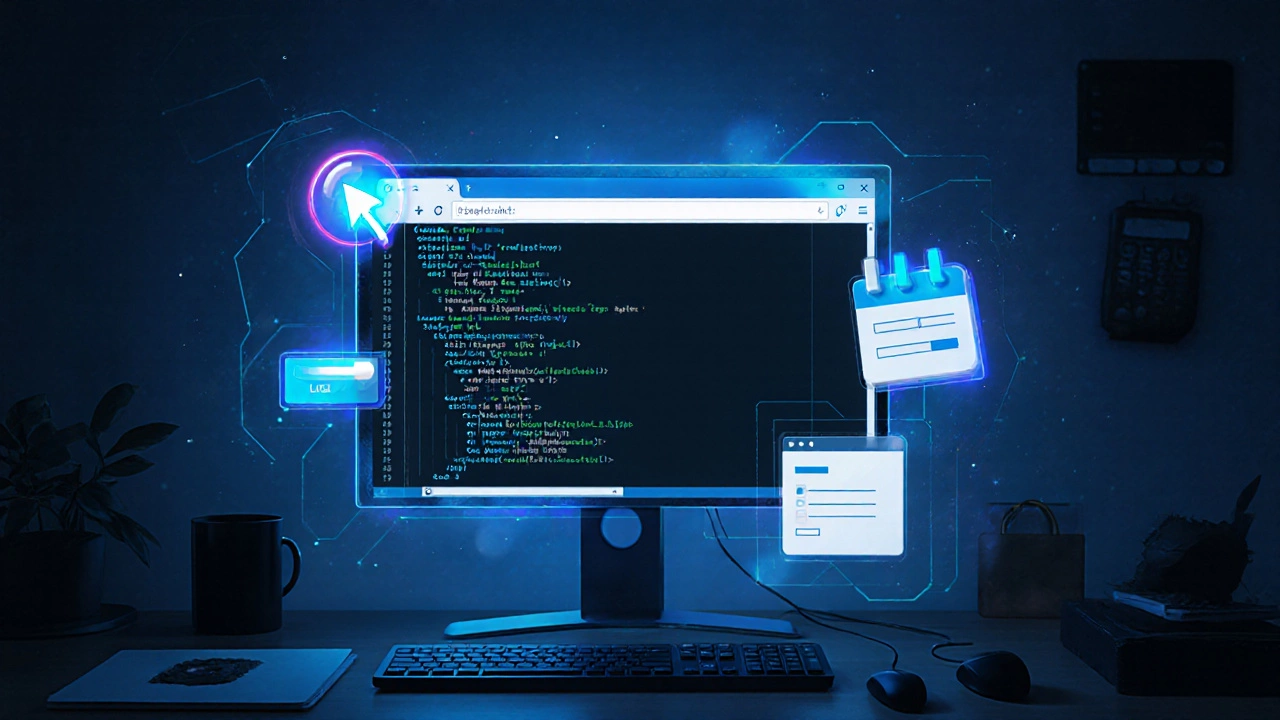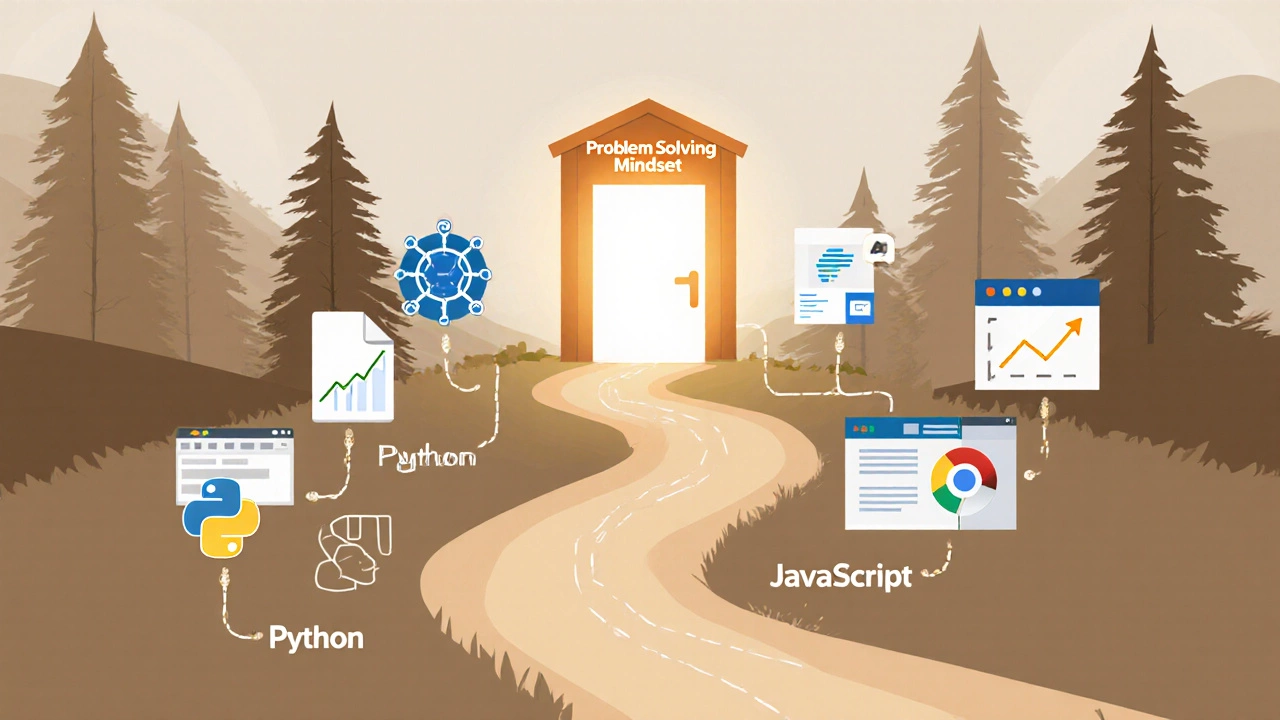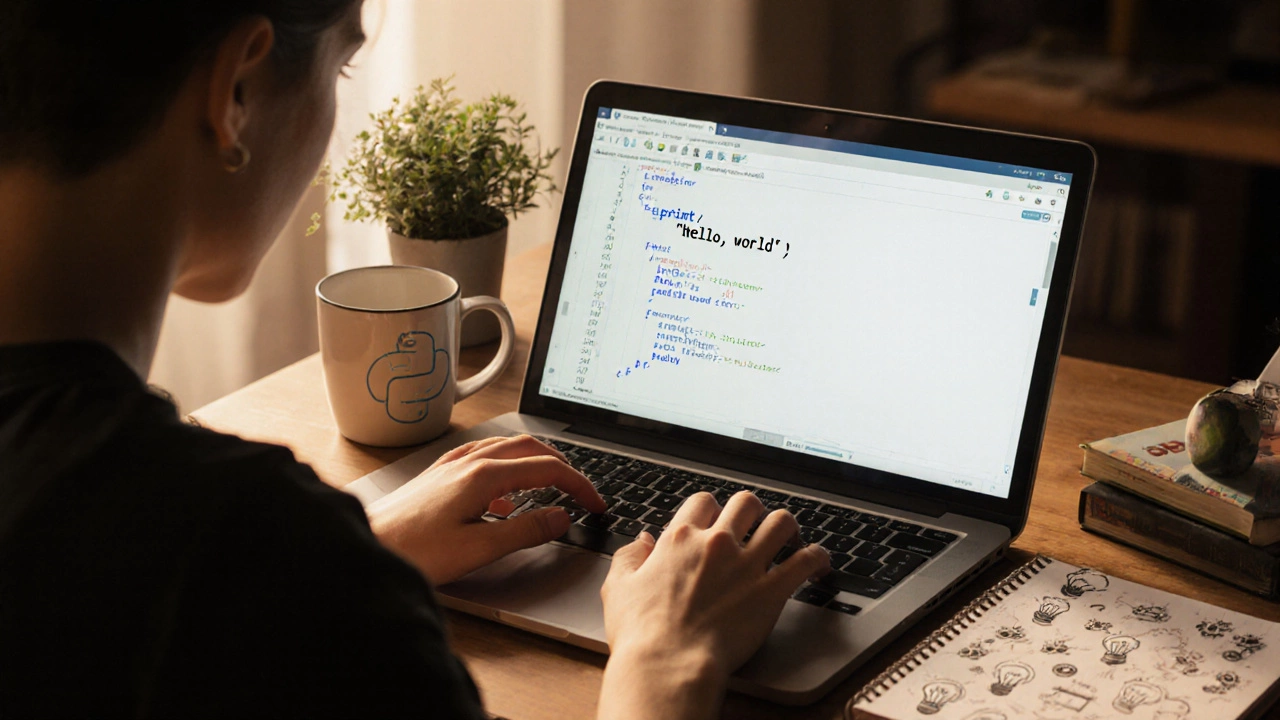Programming Language Selector
Choose your goal
Select what you want to build to get your personalized recommendation
Your Recommendation
Starting to code feels overwhelming. There are so many languages out there-Python, JavaScript, Java, C++, Ruby-and everyone seems to have an opinion on which one you should pick. But here’s the truth: the best first language isn’t the most powerful, the most popular, or the one your friend swears by. It’s the one that gets you building something real, fast, and without drowning in complexity.
Why the first language matters more than you think
Learning to code isn’t like learning a spoken language where you just memorize words. It’s about training your brain to think in logic, structure, and problem-solving. The language you start with shapes how you see those problems. If you begin with something too abstract or too rigid, you might quit before you even get to the fun part. If you start with something too loose or too messy, you’ll build bad habits that are hard to unlearn later.
Think of it like learning to drive. You don’t start with a Formula 1 car. You start with something simple, reliable, and forgiving. The same goes for coding. The goal isn’t to master the language-it’s to master the mindset. Once you’ve got that, switching languages becomes easy.
Python: The quiet winner for most beginners
Python is the most recommended first language for a reason. It reads like plain English. Want to print something? Just type print("Hello, world!"). Want to add two numbers? 5 + 3. No semicolons, no curly braces, no complex syntax rules to memorize before you can do anything.
By the end of your first hour, you can write a script that renames 100 files, calculates your monthly expenses, or scrapes weather data from a website. That kind of instant feedback is powerful. You see results, and that keeps you going.
Python isn’t just easy to learn-it’s widely used. It powers websites like Instagram and Spotify. It’s the go-to language for data analysis, artificial intelligence, and automation. If you ever want to move into data science, machine learning, or even backend development, Python is your bridge.
It’s not perfect. It’s slower than C++ or Rust. It’s not used for mobile apps or high-performance games. But for a beginner? It’s the perfect sandbox.
JavaScript: If you want to build things people can see
What if you’re more interested in making websites that actually look and feel like real apps? Then JavaScript is your best bet. It’s the only language that runs directly in every web browser. No installs, no setup-just open Chrome, hit F12, and start typing.
With JavaScript, you can make buttons that respond when clicked, sliders that move smoothly, or forms that check your input before you hit submit. You’re not just writing code-you’re building interactive experiences.
It’s not as clean as Python. JavaScript has quirks. Some of its rules feel weird, like why "5" + 3 gives you "53" instead of 8. But those quirks are part of the web. Learning them means you understand how the internet actually works.
If you dream of building your own website, creating browser games, or working on apps like Spotify’s web player, JavaScript is your starting point. And once you know it, you can pair it with frameworks like React or Vue to build even more powerful interfaces.

What about Java, C++, or C#?
You’ll hear these names a lot-especially if you’re looking at computer science degrees or big tech companies. Java is used in Android apps. C++ powers video games and high-speed systems. C# is big in Windows software and game development with Unity.
But here’s the catch: they’re harder. They force you to deal with memory management, complex syntax, and strict rules before you can even print text to the screen. For someone who’s never coded before, that’s like being handed a manual on car engines before being allowed to turn the key.
There’s nothing wrong with these languages. But they’re not beginner-friendly. They’re better as second or third languages, once you already understand how programming works. Jumping into them too early leads to frustration, not progress.
What do you actually want to build?
The best way to choose isn’t by popularity or what’s trending. It’s by what you want to make.
- If you want to automate boring tasks-like organizing files, sending emails, or scraping prices-go with Python.
- If you want to build websites, apps, or anything you can open in a browser-go with JavaScript.
- If you want to make mobile apps for Android-start with Java or Kotlin (but only after you’ve learned the basics of programming).
- If you’re into game development-try C# with Unity, but again, only after you’ve coded something simple first.
Don’t pick a language because it’s "the future." Pick it because it lets you build something you care about right now.
What you’ll need to get started
You don’t need expensive software or a fancy computer. Everything you need is free.
For Python:
- Download Python from python.org (it’s free).
- Install a simple editor like Visual Studio Code.
- Open a new file, type
print("I’m coding!"), and hit run.
For JavaScript:
- Open any web browser (Chrome, Firefox, Edge).
- Press F12 to open Developer Tools.
- Click on the "Console" tab.
- Type
alert("Hello from JavaScript");and press Enter.
That’s it. You’re coding. No setup. No cost. No waiting.

Common mistakes to avoid
Most beginners fail not because they’re not smart enough, but because they make the same mistakes over and over.
- Switching languages too often. You’ll hear "Python is dead," or "JavaScript is messy," and you’ll jump ship. Stick with one for at least 3 months. Mastery comes from repetition, not variety.
- Watching tutorials without coding. Watching someone code is like watching someone swim-you won’t learn to swim that way. Pause the video. Type it out yourself. Break it. Fix it. That’s how you learn.
- Trying to learn everything at once. Don’t try to learn HTML, CSS, JavaScript, React, Node.js, and databases all in the first week. Pick one language. Build one small project. Then move on.
- Comparing yourself to others. You’ll see someone who started last month and already built an app. That doesn’t mean you’re behind. They might’ve had a head start. Focus on your progress, not their highlight reel.
What comes after the first language?
Once you’re comfortable writing code in your first language-meaning you can build small projects without constantly looking up syntax-you’ll start seeing patterns. You’ll realize that programming is less about languages and more about problem-solving.
Then you’ll naturally want to do more. Maybe you’ll learn HTML and CSS to make your Python scripts show up on a website. Or you might learn SQL to store data. Or you might dive into Git to save your work. These aren’t "next languages." They’re tools that help you do more with what you already know.
The real goal isn’t to learn every language. It’s to learn how to learn them. Once you’ve got that, you can pick up any new language in weeks, not months.
Start small. Finish something.
The biggest mistake beginners make is waiting to be "ready." There’s no such thing. You don’t need to know everything. You just need to start.
Write a script that tells you the weather. Build a page that counts how many times you’ve clicked a button. Make a program that guesses your age based on your favorite movie.
Don’t aim for perfection. Aim for completion. Finish one tiny thing. Then do another. Momentum is your greatest ally.
Python or JavaScript. Pick one. Start today. You don’t need to be a genius. You just need to keep going.
Is Python really the best language for absolute beginners?
Yes, for most people. Python’s simple syntax lets you focus on learning how to think like a programmer instead of memorizing complex rules. You can build useful tools-like automating file organization or calculating budgets-in your first day. That immediate reward keeps you motivated. Other languages like Java or C++ are powerful, but they require more setup and abstract thinking before you see results.
Can I learn JavaScript without knowing HTML or CSS?
You can start learning JavaScript on its own using the browser’s console. But if you want to build interactive websites, you’ll need HTML and CSS eventually. Think of JavaScript as the brain, HTML as the skeleton, and CSS as the skin. You don’t need to master all three at once. Learn JavaScript first to understand logic and interactivity, then add HTML and CSS when you’re ready to make things look good.
How long does it take to get good at coding?
You’ll be able to write simple, useful programs in 2-4 weeks with consistent practice-about 30 minutes a day. Becoming confident enough to apply for entry-level jobs or freelance work usually takes 3-6 months. The key isn’t how many hours you log, but how often you build something new. One small project every week beats ten hours of watching videos.
Do I need a degree to become a coder?
No. Many successful developers are self-taught. What matters is what you can build. Employers care more about your portfolio-your GitHub projects, your websites, your automation scripts-than your diploma. If you can show you can solve real problems with code, you’ll get hired. Focus on building, not credentials.
What if I pick the wrong language?
There’s no such thing as the "wrong" first language if you’re learning to think like a programmer. Even if you start with JavaScript and later switch to Python, the logic you learned doesn’t disappear. Programming concepts-variables, loops, functions-are the same across languages. Switching is normal. Staying stuck because you’re afraid of "wasting time" is the real risk.
